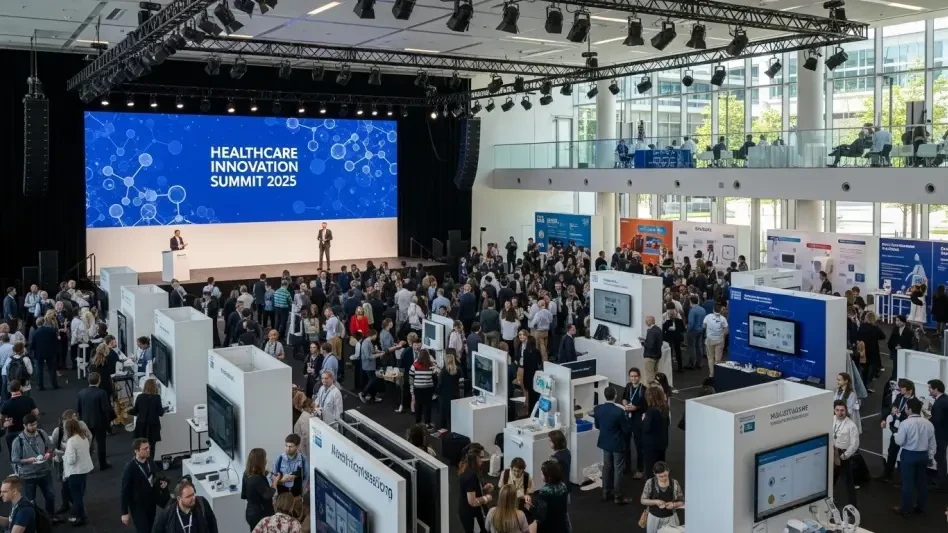In an era where healthcare faces unprecedented challenges—from aging populations to complex diseases—how can innovation bridge the gap between cutting-edge technology and patient-centric care? The Campus Clínic Innova 2025 Conference, held at the Faculty of Medicine and Health Sciences at the University of Barcelona, emerged as a pivotal arena to answer this pressing question. Hosted by Hospital Clínic Barcelona, IDIBAPS, ISGlobal, and Món Clínic, this event united healthcare professionals, researchers, and managers to explore transformative ideas and celebrate groundbreaking projects. Aligned with the NUCLI 2025 Strategic Plan, the conference underscored a collective mission to drive systemic change through innovation, setting a powerful tone for shaping the future of biomedicine.
Key Moments from a Transformative Gathering
The conference captivated attendees with a dynamic lineup of activities, offering a comprehensive look at how innovation is redefining healthcare. From thought-provoking expert talks to interactive workshops, the event provided a platform for exchanging ideas that tackle real-world challenges. It also spotlighted award-winning projects, demonstrating tangible solutions that promise to enhance patient outcomes and operational efficiency across the sector.
A significant highlight was the morning session, where international perspectives illuminated critical topics shaping the industry. The afternoon shifted focus to collaborative strategies and local innovations, ensuring a balance between global insights and actionable, community-driven initiatives. This blend of discussions and hands-on engagement painted a vivid picture of a healthcare landscape on the cusp of profound transformation.
Global Voices: Expert Insights on Healthcare’s Future
The morning session featured an impressive roster of international speakers who delved into pressing issues like artificial intelligence (AI) in clinical settings and the ethical implications of digital tools. Trine Bartholdy from the BioInnovation Institute emphasized the need to turn scientific breakthroughs into practical health solutions, while Lekshmy Parameswaran of The Care Lab reimagined hospitals as hubs extending care beyond physical walls. Oliver Patel of AstraZeneca struck a chord by addressing the delicate balance between AI’s potential and its ethical risks, urging a cautious yet progressive approach.
Other speakers, such as Patrick Georgii-Hemming from Karolinska University Hospital, highlighted the power of data in optimizing care delivery, while Sade Krijgsman from Maasstad Hospital focused on responsible AI integration. Maria Barreira Gonzalez of Catapult CGT UK explored the promise of gene editing, and Thomas Hagemeijer of HGM Advisory offered strategic guidance on digital transformation for hospitals. Their collective message resonated clearly: innovation must prioritize patient well-being and ethical standards to achieve lasting impact.
Building Bridges: Institutional Roundtable Discussions
The afternoon session shifted gears with an institutional roundtable that brought together prominent leaders to discuss the power of collaboration. Dr. Josep M. Campistol of Hospital Clínic Barcelona and Dr. Susana Puig of IDIBAPS articulated a unified vision for systemic change, stressing that progress hinges on seamless partnerships across research, clinical care, and administrative domains. Their dialogue revealed a shared commitment to breaking down silos in the healthcare ecosystem.
This conversation underscored the necessity of aligning diverse stakeholders toward common goals, such as improving access to advanced therapies and streamlining management processes. By fostering inter-institutional synergy, the roundtable laid a foundation for initiatives that can scale effectively, ensuring that innovative solutions reach those who need them most. The emphasis on unity provided a refreshing perspective on overcoming fragmented approaches often seen in the sector.
Interactive Engagement: Workshops and Networking
Beyond formal talks, the conference prioritized hands-on learning through a series of workshops and networking opportunities designed to spark creativity and collaboration. These interactive sessions allowed participants to dive into practical applications of emerging technologies, from AI-driven diagnostics to process optimization tools. Attendees left with actionable strategies to implement in their respective fields.
Networking activities further amplified the event’s impact by connecting like-minded professionals eager to share challenges and solutions. This environment of open dialogue reinforced the importance of community in driving innovation, as participants forged relationships that could lead to future partnerships. The palpable energy in these sessions highlighted a collective determination to translate inspiration into real-world results.
Celebrating Ingenuity: Innovation Awards and Winning Projects
A standout feature of the conference was the recognition of pioneering projects through the Campus Clínic Innova innovation call, spanning categories like “Ideas to Market” and “Improving the Clínic.” In the “Incubate Ideas” segment for early-stage concepts, projects such as NanoLynch, VISTA, and Encephalometer each earned €15,000 and a 12-month support program to nurture their growth. Meanwhile, advanced initiatives in the “Accelerate Ideas” category, including BIMMIA, ROBORETO, and Fetal Brain Care, secured €30,000 alongside tailored guidance.
For internal improvements under “Improving the Clínic,” Serena-Ment and VeuClinCat received €5,000 each, with a commitment to implementation within two years. These awards not only celebrated creativity but also ensured a robust pipeline of ideas, from nascent concepts to near-market solutions, demonstrating a clear dedication to fostering innovation at every stage. The diversity of recognized projects reflected a holistic approach to addressing healthcare’s multifaceted challenges.
Reflecting on a Milestone Event
Looking back, the Campus Clínic Innova 2025 Conference stood as a landmark moment in the journey toward a more innovative healthcare landscape. It successfully bridged global expertise with local ingenuity, creating a melting pot of ideas that challenged conventional thinking. The event’s emphasis on ethical technology adoption and collaborative frameworks left a lasting impression on all who attended.
As the healthcare sector moves forward, the next steps involve sustaining this momentum by supporting awarded projects through their development phases and fostering ongoing dialogue among stakeholders. Policymakers, institutions, and innovators must prioritize funding and regulatory pathways that accelerate the adoption of these solutions. By building on the connections and insights gained during this gathering, the industry can pave the way for a future where technology and compassion converge to deliver unparalleled care.









